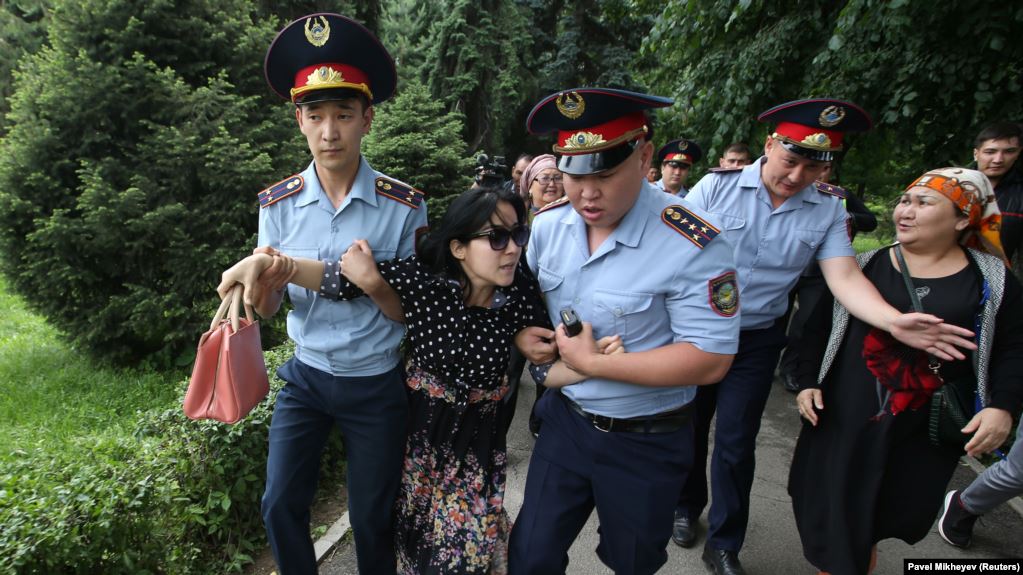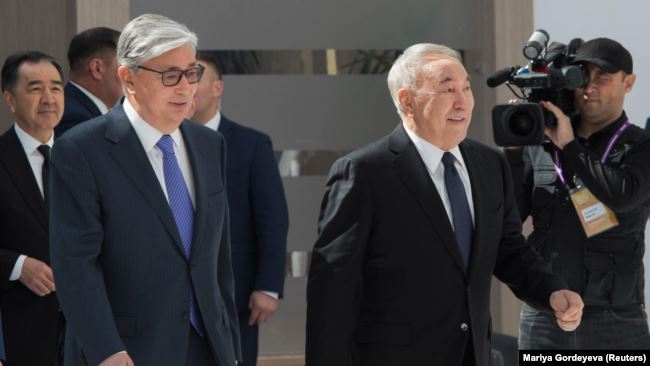
Reports from Kazakhstan say authorities have been arresting demonstrators in some districts of the country's largest city, Almaty, after hundreds of people gathered to protest the official results of the June 9 presidential election.
Video posted on social media from Almaty early on June 11 local time showed dozens of people running in the streets and being pursued by a special police unit.
The arrests in the early morning hours came after more than 100 protesters had gathered outside a police building in Almaty late on June 10 to demand the release of a popular folk singer named Rinat Zaitov.
Zaitov was among dozens of demonstrators arrested earlier on June 10 after gathering in the center of Almaty to protest the official results of the election, which international observers said was "tarnished" by "clear violations of fundamental freedoms."
Zaitov was eventually released and asked the demonstrators to return to their homes shortly before the arrests began.
Citing preliminary results, election authorities said on June 10 that interim President Qasym-Zhomart Toqaev, former authoritarian President Nursultan Nazarbaev’s handpicked successor, had won more than 70 percent of the vote.
The June 9 election -- the first balloting for a new president in three decades -- was marred by the arrest of hundreds of anti-government protesters in the energy-rich Central Asian nation.
Toqaev's landslide victory was widely expected after he received the blessing of Nazarbaev, who officially stepped down as president in March after ruling Kazakhstan for nearly 30 years.
Nazarbaev continues to hold many important political positions and still wields considerable power within the country and inside his political party, Nur-Otan, whose presidential candidate was Toqaev.

Kazakh interim President Qasym-Zhomart Toqaev (left) and former President Nursultan Nazarbaev (file photo)
Talking to journalists in Nur-Sultan on June 10, Toqaev said the election-day protests by hundreds of demonstrators in Almaty, Shymkent, and other cities were "illegal" and had been staged by people who were "misled by information from abroad."
Toqaev expressed "gratitude" to police officers who he said "performed their duties properly during the demonstrations."
"In future they will operate in the same way," Toqaev said.
Toqaev also said his inauguration would take place on June 12, provided that the Central Election Commission announces the final official results by then.
Meanwhile, dozens rallied in Almaty's Old Square on June 10 for a second day, as police and National Guard officers cordoned off the site and a nearby park.
People driving their vehicles around the square honked their horns in support of the protesters.
An ambulance was called to assist one demonstrator who had cut his wrist after he was detained by officers.
When an RFE/RL correspondent asked a police officer about the reason for the detentions, he said that those detained did not have identification documents with them.
In the capital, Nur-Sultan, dozens of people also gathered at a central square that was cordoned off by police.
'Scant Respect' For Democratic Standards
The Central Election Commission said on June 10 that Toqaev, 66, had received 70.76 percent of the vote in the presidential polls.
Former journalist Amirzhan Qosanov was a very distant second with 16.02 percent.
Monitors from the Organization for Security and Cooperation in Europe (OSCE) said in a statement that "a lack of regard for fundamental rights, including detentions of peaceful protesters, and widespread voting irregularities on election day, showed scant respect for democratic standards."
"While there were seven candidates, including for the first time a woman, the election showed that there is a need for genuine democratic consolidation and significant political, social and legal reforms," said George Tsereteli, special coordinator and leader of the OSCE short-term observer mission.
A wave of protests across Kazakhstan during the campaign period against the lack of fairness in the election continued on election day, with police acting quickly to end any rallies.
Toqaev Heads For Victory In Kazakh Vote Amid Clashes
Hundreds of protesters calling for free and fair elections were detained in Almaty, Nur-Sultan, and the southern city of Shymkent as a result, with Deputy Interior Minister Marat Qozhaev calling the demonstrators "radically-minded elements."
Security measures had been heavily stepped up in Nur-Sultan and Almaty, RFE/RL reported.
Extremely Slow Internet
Internet access in the two cities was reported to be extremely slow, preventing live streaming and making it very difficult to read social media sites.
Meanwhile, Qosanov, who positioned himself as an opposition candidate, said on June 10 that he planned to set up a new political party ahead of parliamentary elections next year.
Addressing his supporters in Astana, he said he considered his presidential bid a success, claiming that it helped "legitimize" the opposition.
However, some of those attending the meeting called Qosanov "a politically dead person" and "a puppet candidate" because he conceded defeat before the official election results were made public.
He was also criticized for posting a video statement on Facebook late on June 9 in which he called the anti-government rallies a "real political provocation" by supporters of "pseudo-opposition figures” based abroad.
None of the elections held in Kazakhstan since it became independent in 1991 has been deemed free or fair by international organizations.
Many activists were detained and given fines or jail sentences in the run-up to the election, while some young male activists have been suddenly drafted into the army.
Nazarbaev's reign was marked by economic progress fueled by plentiful reserves of oil and natural gas, but it was largely overshadowed by a repressive regime that shut down independent media, suppressed protests, and trampled democratic norms.
Human Rights Watch wrote recently that Kazakhstan "heavily restricts" basic freedoms such as speech, religion, and assembly, while Freedom House calls the Kazakh government a "consolidated authoritarian regime."
A career diplomat educated in Moscow and considered an expert on China, Toqaev has served as Kazakh prime minister, foreign minister, and chairman of the Senate. He also worked for the United Nations in Geneva in 2011-13.
Toqaev has said publicly that he will continue the same policies as Nazarbaev if elected as president.
Nazarbaev's daughter, Darigha, replaced Toqaev as Senate leader in March and would be first in line to the presidency should anything happen to the president.
Original source: With reporting by Reuters, TASS, and Kazinform




